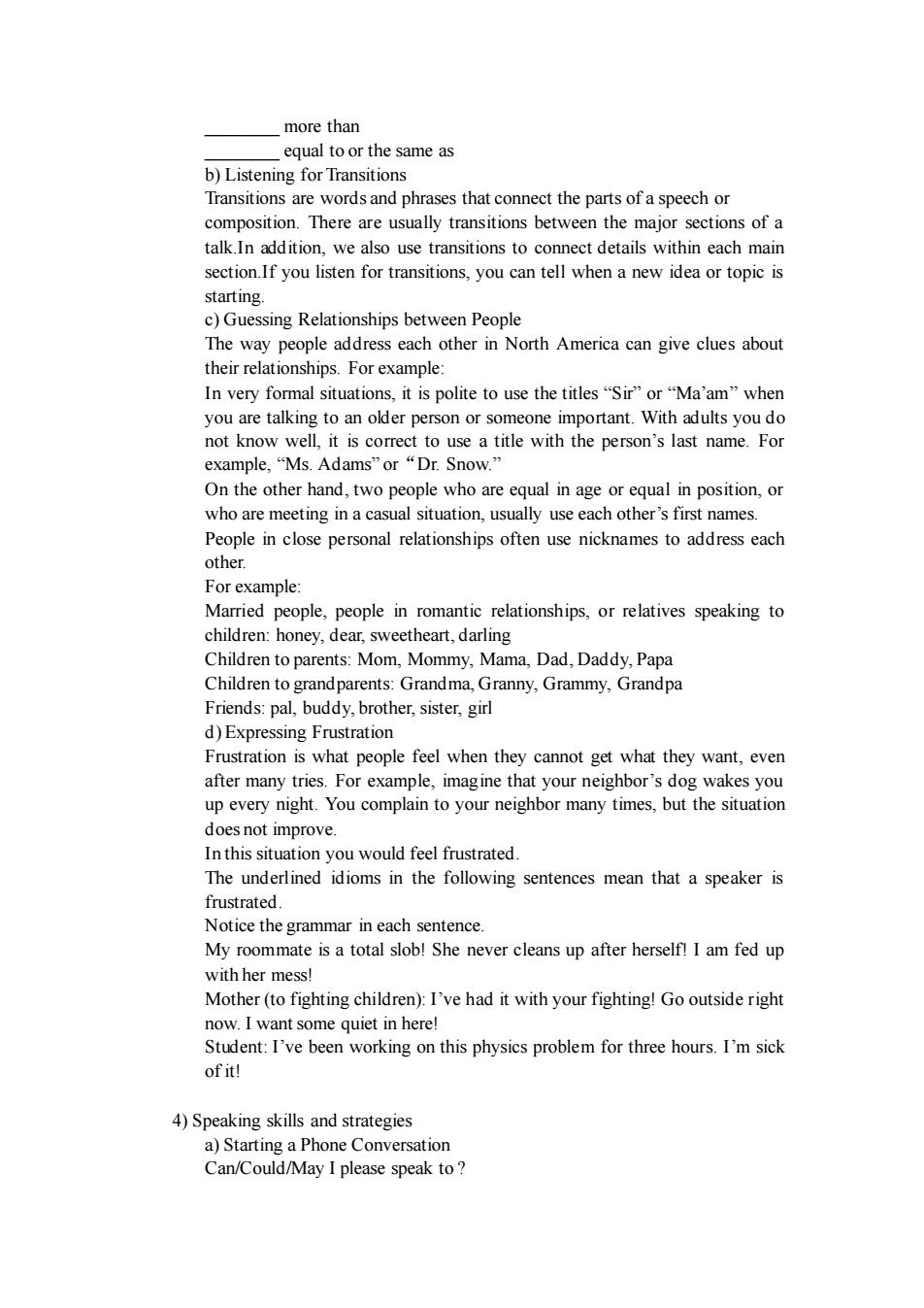正在加载图片...

more than ual toor the same as b)Listening for Transitions Transitions are words and phrases that connect the parts of a speech or composition.There are usually transitions between the maior sections of a talk in addition.we also use transitions to connect details within each main section.If you listen for transitions,you can tell wher new idea or topic starting c)Guessing Relationships between People The way people address each other in North America can give clues about their relationships.For example: In very formal situations,it is polite to use the titles"Sir"or"Ma'am"when you are talkin an oer person or so not kr example."Ms.Adams"or "Dr.Snow. On the other hand,two people who are equal in age or equal in position.or who are meeting in a casual situation,usually use each other's first names. People in persoa relationships ofte n use nicknames to address each other For example. Married people,people in romantic relationships,or relatives speaking to children:honey,dear,sweetheart,darling Children to parents:Mom,Mommy,Mama,Dad,Daddy,Papa Childre en to grand s:Gra dma,Granny,Grammy,Grandpa Friends:pal,buddy,brother,sister,gir d)Expressing frustration Frustration is what people feel when they cannot get what they want,even after many tries.For example,imagine that your neighbor's dog wakes you up every night.You nlai to you neighb many tim es,bu the sit does not improve In this situation you would feel frustrated. The underlined idioms in the following sentences mean that a speaker is frustrated. Notice the grammar in each sentence My roommate is a total slob! She never cleans up after herself!I am fed up with her mess Mother(to fighting children):I've had it with your fighting!Go outside right now.I want some quiet in herel Student:I've been working on this physics problem for three hours.I'm sick of it! 4)Speaking skills and strategies a)Starting a Phone Conversation Can/Could/May I please speak to? ________ more than ________ equal to or the same as b) Listening for Transitions Transitions are words and phrases that connect the parts of a speech or composition. There are usually transitions between the major sections of a talk.In addition, we also use transitions to connect details within each main section.If you listen for transitions, you can tell when a new idea or topic is starting. c) Guessing Relationships between People The way people address each other in North America can give clues about their relationships. For example: In very formal situations, it is polite to use the titles “Sir” or “Ma’am” when you are talking to an older person or someone important. With adults you do not know well, it is correct to use a title with the person’s last name. For example, “Ms. Adams” or“Dr. Snow.” On the other hand, two people who are equal in age or equal in position, or who are meeting in a casual situation, usually use each other’s first names. People in close personal relationships often use nicknames to address each other. For example: Married people, people in romantic relationships, or relatives speaking to children: honey, dear, sweetheart, darling Children to parents: Mom, Mommy, Mama, Dad, Daddy, Papa Children to grandparents: Grandma, Granny, Grammy, Grandpa Friends: pal, buddy, brother, sister, girl d) Expressing Frustration Frustration is what people feel when they cannot get what they want, even after many tries. For example, imagine that your neighbor’s dog wakes you up every night. You complain to your neighbor many times, but the situation does not improve. In this situation you would feel frustrated. The underlined idioms in the following sentences mean that a speaker is frustrated. Notice the grammar in each sentence. My roommate is a total slob! She never cleans up after herself! I am fed up with her mess! Mother (to fighting children): I’ve had it with your fighting! Go outside right now. I want some quiet in here! Student: I’ve been working on this physics problem for three hours. I’m sick of it! 4) Speaking skills and strategies a) Starting a Phone Conversation Can/Could/May I please speak to ?